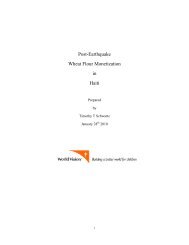Food Consumption Patterns Part 2
Create successful ePaper yourself
Turn your PDF publications into a flip-book with our unique Google optimized e-Paper software.
82<br />
<br />
<br />
<br />
<br />
<br />
<br />
<br />
<br />
<br />
Enforcement is, need we add, non-existent. Nor are there courts and lawyers competent to<br />
deal with adjudicating relevant cases<br />
Neither MARNDR nor MIC were able or willing to provide the consultants with a single<br />
document that defines the law (the document cited above and included in Annex 16 came<br />
from a secretary acting independently of the Ministry)<br />
Most of the Haitian government websites are, to put it bluntly, facades with nothing behind<br />
them, no data, no downloadable documents. Click a hyperlink or downloadable document<br />
and in the vast majority of cases one gets nothing except perhaps a “site under<br />
construction.’ Associated service provider sites offer little data as well, other than typically<br />
contacts to lawyers or agents with the offer of facilitating access to the market for fees<br />
MIC staff referred the consultant to the “Director” who knew nothing but recommended a<br />
lawyer, saying, ‘he knows’<br />
According to distributors (see contact list) there are zero controls on patents or use of<br />
copyrighted advertisements, for example Spider Man, evident in the “vitamin sticks” from<br />
China (see Figure 30 above)<br />
No inspection labels exist, despite laws mandating them<br />
When we visited three local peanut producers, having gotten their contact information from<br />
jars of peanut butter in supermarkets, we arrived at impoverished households with zero<br />
phytosanitary controls. It never occurred to any of them that they could be inspected by a<br />
government official<br />
Imported eggs and breads available in the top Port-au-Prince Supermarkets have no<br />
expiration dates<br />
One distributor/informant interviewed during the course of the research proudly<br />
proclaimed that, “Haiti has more laws governing distribution than the US ….” It is difficult<br />
to verify whether this is true, since they are neither applied nor published. But the most<br />
important point that the businessman was making is that those laws that are applied are<br />
there to protect big business—such as his own. There are no active consumer laws. In short,<br />
it is a paradise for unethical and locally connected business owners, but a prospective<br />
nightmare for consumers who may fall sick from products.<br />
Elite, Imports, Corruption, Political Instability and the Stacked Deck<br />
In the absence of government regulations seen above, any endeavors to import must consider the<br />
competitive advantage of those already importing and in control of the customs houses and ports.<br />
Figure 32 on the following page uses edible oil imports to illustrate the problems with corruption<br />
and favoritism, and elite control of customs houses. Haiti produces no edible oil and, as seen<br />
earlier, the population is on the margin of survival regarding edible oil consumption. Biologically,<br />
the Haitian population cannot survive with significantly less oil than is imported in the maximum<br />
years seen in Section 5. Yet, with the lone exception of the year 2002—more than 2 times higher<br />
than the two years around it—we see that the official tally of oil imports fell far below this<br />
threshold. This is most likely a reflection of the impact of tax evasion by oil importers that<br />
fluctuates with the major political events of the time. For example, changes in recorded imports<br />
surrounding the fall of the Aristide government in 2004 have been attributed by some observers to
















